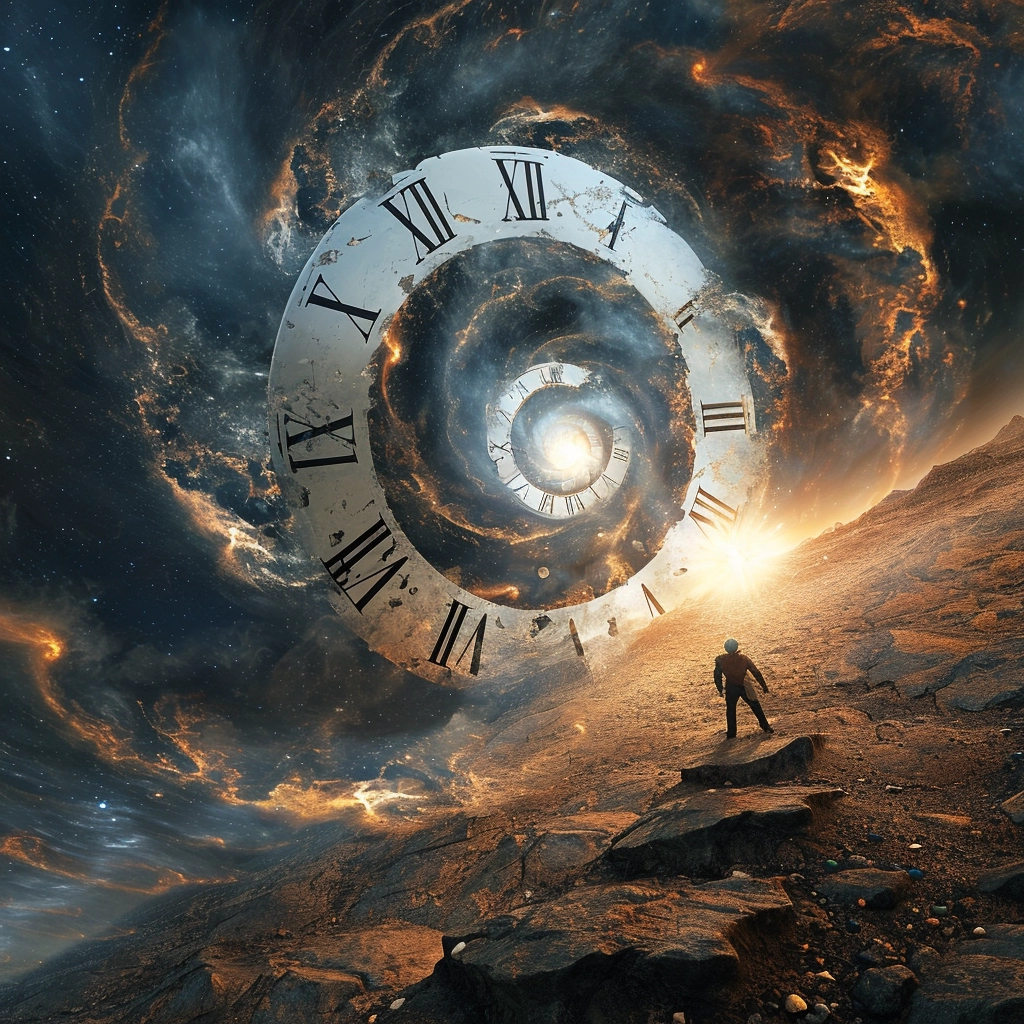
Time Travel: Unlocking the Mysteries of the Past and Supercharging Our Future Imagination
Step into the captivating world of time travel, where the boundaries of reality blur and the possibilities become infinite. The mystery of time travel has captivated the imaginations of scientists, writers, and dreamers alike. From H.G. Wells’ classic novel “The Time Machine” to the mind-bending concepts of quantum physics, the idea of traversing through time has sparked awe and wonder for generations. But is time travel just a product of science fiction, or is it something that could potentially become a reality? In this article, we will explore the fascinating world of time travel, delving into the scientific theories, the potential methods, and the mind-boggling paradoxes that surround this enigmatic concept.
Join us as we embark on a journey through the fabric of time, examining the mysteries that lie within, and uncovering the secrets that could unlock the doors to the past or future. From Einstein’s theory of relativity to the possibilities of wormholes and parallel universes, we will unravel the complexities of time travel and attempt to answer the age-old question: is time travel truly possible? Prepare to have your mind stretched and your sense of reality challenged as we dive headfirst into the captivating world of the mystery of time travel.

What is Time Travel?
Time travel, in its simplest form, is the concept of moving between different points in time, in a similar way to how we move in space. It is a concept that has been a staple of science fiction for centuries, and it’s one that continues to fascinate us to this day. But what exactly is linetogel time travel, and how does it work? Let’s start by exploring the nature of time itself.
Time, as we understand it, is a dimension. It’s something that we move through, in one direction, at a constant speed. We can think of our journey through time as being like a journey along a road. We are always moving forward, and we can’t go back. But what if we could? What if it were possible to turn around and travel back down the road, to revisit past moments in time? This is the essence of time travel.
It’s important to note, however, that time travel isn’t just about going back in time. It could also involve traveling into the future. While we are all constantly moving into the future at the rate of one second per second, the idea of time travel suggests that it might be possible to skip ahead, to move into the future at a rate faster than the normal flow of time.
The Concept of Time in Physics
In physics, time is considered to be the fourth dimension, alongside the three spatial dimensions. This concept is central to Albert Einstein’s theory of relativity, which revolutionized our understanding of time and space. According to relativity, time and space are not separate entities, but are interwoven into a single four-dimensional fabric known as spacetime.
One of the most groundbreaking aspects of relativity is the idea that time is not fixed and absolute, but is flexible and relative. It can be stretched or squeezed, depending on the strength of the gravitational field and the speed of movement. This leads to the phenomenon known as time dilation, where time can appear to move slower or faster depending on these factors.
Time dilation has some fascinating implications for time travel. According to relativity, if you were to travel at near-light speeds or spend time near a massive object, such as a black hole, you could theoretically experience time more slowly than someone who remained stationary. This means that you could return from your journey to find that more time has passed for the restive world than for you, effectively allowing you to travel into the future.
Theories of Time Travel
There are several theories that suggest time travel might be possible, each with its own set of challenges and paradoxes. One of the most well-known is the concept of wormholes. These are theoretical tunnels through spacetime that could potentially provide shortcuts between different points in time and space. While wormholes are purely theoretical at this point, they are a fascinating concept that could potentially allow for time travel.
Another theory is based on the concept of cosmic strings, which are hypothetical 1-dimensional defects in the fabric of the universe. If these strings exist, and if they were to be arranged in a certain way, they could potentially create a loop in time that would allow for time travel. However, this theory is highly speculative and has yet to be supported by empirical evidence.
Finally, there’s the theory of quantum superposition, which is a principle of quantum mechanics. This principle suggests that particles can exist in multiple states simultaneously until they are observed. Some theorists have suggested that this principle could be applied to the macroscopic world, potentially allowing for multiple timelines and, by extension, time travel. However, this theory is highly controversial and remains purely speculative.
Paradoxes and Challenges of Time Travel
Time travel is not without its paradoxes and challenges. Perhaps the most famous is the grandfather paradox. This is the idea that if you were to travel back in time and kill your own grandfather before your father was born, you would prevent your own existence. But if you didn’t exist, then how could you have traveled back in time in the first place? This paradox highlights the potential inconsistencies and contradictions that could arise with time travel.
Another challenge is the potential for causality violation. This is the notion that the cause of an event could occur after the event itself in a timeline, which would violate our understanding of cause and effect. This could lead to logical contradictions and inconsistencies, which pose serious challenges to the concept of time travel.
Despite these challenges, some theorists believe that these paradoxes may be resolvable. For example, the many-worlds interpretation of quantum mechanics suggests that each time a decision is made, the universe splits into multiple parallel universes, each representing a different outcome. If this interpretation is correct, then time travel might not create paradoxes but instead create new timelines.
Examples of Time Travel in Literature and Pop Culture
Time travel has been a popular theme in literature and pop culture for many years. From H.G. Wells’s “The Time Machine” to the “Back to the Future” series, the idea of moving through time has captivated audiences worldwide. These stories often explore the potential consequences of altering the past or the future, and they frequently delve into the paradoxes and complexities that could arise from time travel.
In addition to these well-known examples, there are countless other works of fiction that explore the concept of time travel in unique and creative ways. For example, the film “Interstellar” uses the theory of relativity to depict time dilation, while the TV show “Doctor Who” depicts time travel through a variety of scientific and fantastical means.
These stories not only entertain us, but they also provoke thought and discussion about the nature of time, the possibilities of time travel, and the ethical implications of altering the past or the future.

The Science Behind Time Travel
While time travel is largely a product of fiction, there is some scientific basis for the concept. As we’ve discussed, Einstein’s theory of relativity suggests that time is not fixed and absolute, but is flexible and relative. This theory has been confirmed by numerous experiments and observations, and it forms the backbone of our current understanding of the universe.
Furthermore, the field of quantum mechanics, which deals with the behavior of particles at the subatomic level, has also been suggested as a potential basis for time travel. The principle of quantum superposition, which suggests that particles can exist in multiple states simultaneously, could potentially be applied to the macroscopic world, potentially allowing for multiple timelines and time travel. However, this theory is highly controversial and remains speculative.
It’s also worth mentioning that while there is some scientific basis for the concept of Temporal displacement, there is currently no practical method for achieving it. The technologies and energies required to manipulate spacetime in the ways necessary for Temporal displacement are far beyond our current capabilities.
Temporal displacement Experiments and Research
Despite the challenges and uncertainties, there is ongoing research into the possibility of time travel. Much of this research is theoretical, focusing on exploring the implications of relativity and quantum mechanics for the concept of Temporal displacement.
For example, there has been research into the potential existence and properties of wormholes, as well as the potential for time travel using cosmic strings. These studies are largely based on mathematical models and simulations, and they have yet to be confirmed by empirical evidence.
In addition to this theoretical research, there have also been some experimental attempts to test the concept of Temporal displacement. For example, in 2014, a group of physicists conducted an experiment to test the feasibility of quantum time travel. While the results were inconclusive, the experiment was a fascinating demonstration of the potential for Temporal displacement research.
Ethical Implications of Time Travel
If time travel were possible, it would raise a host of ethical questions. For example, would it be ethical to alter the past, potentially changing the course of history? What would be the consequences of such actions, and who would be responsible for them?
Additionally, there are questions about the potential for misuse of Temporal displacement. If the technology were to fall into the wrong hands, it could be used for nefarious purposes, such as altering the outcome of historical events for personal gain.
Furthermore, there’s the question of the potential impact on personal identity. If you were to travel back in time and interact with your past self, who would you be? Would you still be the same person, or would you become a different person? These are complex questions that touch on the nature of personal identity and the nature of time itself.

The Future of Time Travel Technology
Looking ahead, the future of time travel technology is uncertain. While there is some theoretical basis for the concept, there are many challenges and uncertainties that need to be overcome. Furthermore, the technologies and energies required for Temporal displacement are far beyond our current capabilities.
However, the field of time travel research is still young, and there are many exciting possibilities to explore. With advances in technology and our understanding of the universe, it’s possible that we might one day be able to unravel the mysteries of Temporal displacement.
In the meantime, we can continue to explore the concept of Temporal displacement through science fiction, using it as a tool to provoke thought and discussion about the nature of time, the possibilities of time travel, and the ethical implications of altering the past or the future.
The Ongoing Mystery of Time Travel
In conclusion, the mystery of Temporal displacement continues to captivate us. From the scientific theories to the potential methods, from the mind-boggling paradoxes to the ethical implications, time travel is a fascinating and complex concept that challenges our understanding of the universe and our place within it.
Whether time travel will ever become a reality remains to be seen. However, the journey of exploring the concept is a worthwhile endeavor in itself, providing us with a richer understanding of the universe and our place within it. As we continue to explore the mysteries of Temporal displacement, we can look forward to new insights, new discoveries, and new possibilities for the future.
If this journey through the fabric of time has sparked your interest, we invite you to continue your exploration with our article about the Oppo A78, where we delve into the innovative features of this cutting-edge device. Until our paths cross again, may your curiosity guide you through the wonders of both the past and the present.





